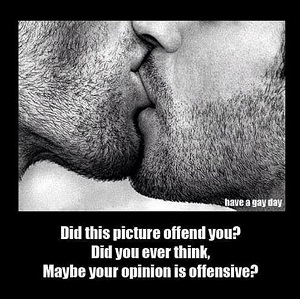 At the start of 2014 Facebook issued an apology for wrongly removing (repeatedly) an image of two men kissing. The removal came with a statement saying the image breached the platform’s community standards. Those who had posted the image claim over 100 accounts were suspended for posting the image. The reversal came after media reporting by PinkNews.
At the start of 2014 Facebook issued an apology for wrongly removing (repeatedly) an image of two men kissing. The removal came with a statement saying the image breached the platform’s community standards. Those who had posted the image claim over 100 accounts were suspended for posting the image. The reversal came after media reporting by PinkNews.
In 2011 Facebook made headlines internationally for their defense of rape jokes on the platform, which they said were offensive but acceptable. It took until 2013, and a major campaign that led to 15 major companies withdrawing millions in advertising, before Facebook reversed course and agreed the content was unacceptable and they had been getting it wrong.
Facebook is getting better, and faster, at apologizing and correcting new mistakes. Older issues, however, are harder to correct. When it comes to Holocaust denial, the first category of hate speech Facebook refused to recognise, Facebook’s position remains unchanged. Perhaps one day they will apologize for getting it wrong for so many years.
The latest incident was also faster than usual because the campaign argued for content to remain up, rather than arguing for it to be removed. Facebook was also relatively quick in restoring content exposing antisemitism on YouTube after wrongly removing the posts encouraging others to report it. That still leaves the question of why this content was removed in the first place.
The picture at the center of the incident carried the caption “Did this picture offend you? Did you ever think, maybe your opinion is offensive?” The image is clearly not hate speech (quite the opposite!) so the initial removal appears to be based on the Community Standards prohibition on “Nudity and Pornography”. The image, however, is clearly not nudity as it only shows people’s faces. In terms of pornography, were the image of a man and woman kissing, the idea it could be pornographic would be deemed absurd. Treating it differently because it was two men sends a message that gay relationships themselves are offensive. Such a position could fairly be described a homophobic and is clearly out of touch with modern norms and values.
Facebook did the right thing restoring the content and apologizing. More significantly, Facebook is becoming more willing to recognise when content has been wrongly removed and more willing to restore it. Unfortunately, Facebook has also lately been reversing decisions to remove some hate speech content. Facebook needs good systems to review its decision and correct them when it gets it wrong, but more importantly, it needs to do more to make the right decision in the first place (and on review). A position that is overly restrictive on some content (e.g. the nudity and pornography position) and overly permissive on other content (e.g. hate speech) is not effective. Facebook needs to re-calibrate their approach to be less skewed and to focus on getting it right.
